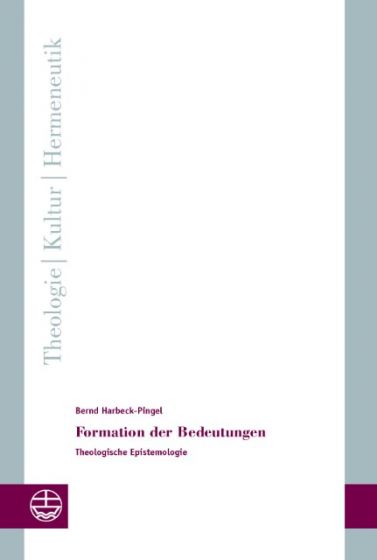Formation der Bedeutungen
Die Theologie ist mit dem ihr eigenen Wissen befasst, das sie als Thema, Gegenstand, Zustandekommen und Begründung ausdifferenziert. Sie reflektiert dabei die Genese und die Veränderung von Wissen sowie das Vergessen. Wie sich die Ethik auf die Zeit, die für Kommunikation und Handlungen benötigt wird, bezieht, so unterliegen auch dogmatische Themen zunächst historischen Transformationen, sodann aber modal und temporal variablen Wahrheitsrelationen. Eine theologische Epistemologie ist für beide, Dogmatik und Ethik, relevant: als Basistheorie des Verstehens, die die alterierenden Formationen von Bedeutungen untersucht. [Formative Processes of Meaning. Theological Epistemology] Theology is concerned with the occurences of knowledge, its variations and neglect. Therefore it has to be considered, what is known, how, and for what reason. Such as ethics refers to the time of communication and interaction, such are dogmatic themes incorporated in historical transformations, and in shifts of truth and truthfulness. Theological epistemology is related to both, dogmatics and ethics, as a basic theory of understanding, how meaning is formed and altered.
Bernd Harbeck-Pingel, Dr. theol., Jahrgang 1968, studierte Evangelische Theologie, Germanistik und Geschichte in Bonn. Er ist Professor für Systematische Theologie an der Evangelischen Hochschule Freiburg. Seine Forschungsschwerpunkte sind Theologie und Ästhetik, Metaphysik und die Ethik des Politischen.
| Autor | Harbeck-Pingel, Bernd |
|---|---|
| Verlag | Evangelische Verlagsanstalt GmbH |
| ISBN | 9783374054589 |
| ISBN/EAN | 9783374054589 |
| Lieferzeit | Vorbestellbar |
| Erfassungsdatum | 08.12.2017 |
| Lieferbarkeitsdatum | 30.01.2024 |
| Einband | Paperback |
| Format | 0.7 x 23.1 x 15.7 |
| Seitenzahl | 108 S. |
| Gewicht | 177 |


